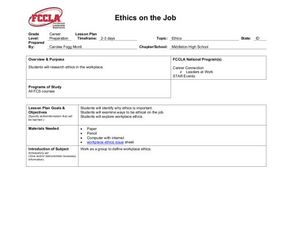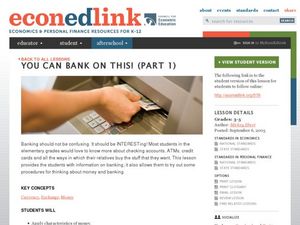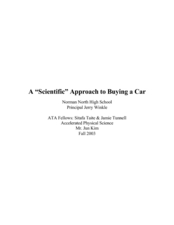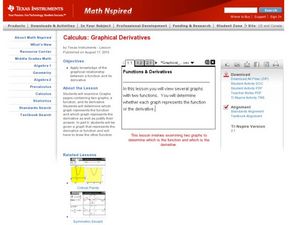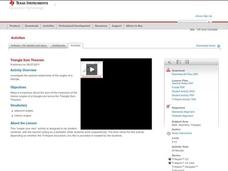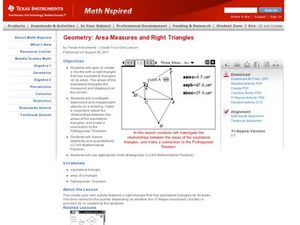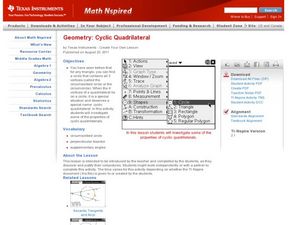Curated OER
Fraction Decimal Challenge
Pupils explore the concept of fractions and decimals as they try to find as many fractions as possible that are equivalent to .25. Learners use their calculator to take screen shots and send them to the teacher via Ti-Navigator. They...
Curated OER
Estimating with Rational Numbers
Students explore the concept of rounding. In this rounding lesson, students round fractions and mixed numbers. Students estimate the sums, differences, products, and quotients of rounded fractions and mixed numbers.
Curated OER
Visual Fractions
Leanrers observe models of fractions and use a calculator to represent numbers as decimals, fractions, and percents. They participate in calculator activities to view different representations of the same number.
Texas Instruments
Exploring Tangents
Explore the concept of tangent lines. In this tangent line lesson, learners graph a circle and two lines on their graphing calculator using Cabri Jr. Students construct the lines so that they both intersect at a given point and are both...
Curated OER
Chemical Compounds
In this chemical compounds learning exercise, students write the name for 10 chemical formulas and then determine the formula from the names of 10 different chemical compounds. This learning exercise has 20 fill in the blank questions.
Curated OER
IB.8 Laboratory Activity-Water Testing (Micro)
Students test different water solutions for the presence of ions. In this water testing lesson plan, students test for iron, calcium, chloride and sulfate ions in solutions. They indicate positive tests based on their results and they...
Curated OER
Low Brass: Tibet, Switzerland and Haiti
Young scholars identify sounds played on instruments from around the world. In this music lesson, students listen to music played on various low brass instruments from Tibet, Switzerland and Haiti to determine the differences in pitch...
Curated OER
Ethics on the Job
Students examine ethics in the workplace. In this Career and leadership lesson, students will pair up to discuss various issues surrounding workplace ethics. This lesson includes 3 different activities, and assessment and necessary...
Council for Economic Education
You Can BANK On This! (Part 1)
Young scholars investigate the concepts of money management and banking through Internet activities. In this economics lesson plan, students discuss the characteristics of money and how people once bartered with goods instead of paying...
Curated OER
Keeping Warm
Students experiment with thermal insulators. In this heat transfer lesson, students predict and then measure heat loss from a cup of water using different materials as insulators. Students complete a line graph to display their results.
Curated OER
What Do Halloween Costumes Say?
Students analyze Halloween costumes they find in magazines to categorize their findings. For this holiday lesson, students discuss their findings about the costumes based on four different elements.
Curated OER
A “Scientific” Approach to Buying a Car
Students examine what it takes to purchase a car and the resources out there to help find what you are looking for. In this scientific method activity students complete different problem solving situations.
Curated OER
Basic Limits
Learners calculate the limits of functions. In this calculus lesson, students find the left and right handed limits of different functions. They use the Ti Navigator to drag the function around as they study limits.
Texas Instruments
Graphical Derivatives
Pupils solve functions using the derivative. They determine the derivative of a function based on its graph, then analyze different functions and draw a relationship and conclusion based on the graph.
Texas Instruments
Minimums, Maximums and Zeroes
Young mathematicians will identify the minimum, maximum-and zeros of a function in this calculus lesson. They relate the derivative of a function to its zeros and minimum or maximum. They then graph their solutions and explain different...
Curated OER
Derivative Analysis
Students analyze the derivative of a graph. In this calculus activity, students identify the different behavior of a graph. They label concavity of the graphs as increasing or decreasing.
Texas Instruments
Convergence of Taylor Series
Learners analyze taylor series for convergence. In this calculus lesson, students analyze the graph of a taylor series as it relates to functions. They use the TI calculator to graph and observe the different series.
Texas Instruments
Variables and Expressions
Students solve equations by writing expressions. In this algebra lesson, students identify the different values for each variable. They use the navigator to see how to solve equations.
Curated OER
Triangle Sum Theorem
Teach your class how to solve problems using the triangle sum theorem. In this geometry activity, students identify the missing angles in a triangle using the sum theorem. They graph triangles on the TI and moves the sides around to...
Curated OER
Scale Factor Area Perimeter
Mathematicians compare triangles at different scales. In this geometry lesson, students calculate the area and perimeter of triangles. They use the Ti to make observation of the change that takes place as the triangles are dilated.
Curated OER
Area Measures and Right Triangles
Your class will investigate the relationship among different triangles. This geometry lesson, demonstrates how to make a connection between triangles and the Pythagorean Theorem. They identify the missing side or angle of a triangle.
Curated OER
Creating a Midpoint Quad
Using a TI Navigator to drag quadrilaterals around to create different shapes, students learn how to draw midpoints in their quadrilaterals. In this geometry lesson plan, students solve problems using the properties of...
Curated OER
Creating a Cyclic Quadrilateral
Identify and make conjecture about properties of cyclic quadrilaterals. Students use the TI Navigator to create different shapes and draw conclusions.
Curated OER
Tessellations with Regular Polygons
Show your learners how to create tessellations using different polygons. This is achieved by having high schoolers make observations of polygons to find the ones that will tessellate.









